Ed Gorman's Blog, page 21
September 25, 2015
Forgotten Books: A Hidden Place by Robert Charles Wilson
Forgotten Books: A Hidden Place by Robert Charles Wilson
In the course of a year I usually read twenty or twenty five novels that impress me. Some for characterization, some for story, some for milieu. But I rarely read a novel that astonishes me.
When Robert Charles Wilson's first novel A Hidden Place appeared as a Bantam paperback original in 1986, I wasn't sure what to make of it. I received it along with three or four other science fiction Bantams. I think I put it on the bottom of the stack. The other novels were by writers I knew. Whatever reluctance I felt vanished when I read the first page.
The story here concerns a young man named Travis Fisher who is sent to live with his aunt because his mother, a troubled woman, has died. What he finds in his aunt's house is an intolerable uncle who demands that Travis lives by steely rules he himself frequently breaks. He also finds Anna, the strange beautiful woman who boards upstairs. Travis is so stunned by her he can barely form sentences. He also takes up Nancy Wilcox, a smart, witty girl who is bursting to escape the brutal social order of this small town.
Parallel to this story line is the one of the odd hobo Bone. Because the novel is set in the worst years of the Depression, Bone becomes our tour guide, showing us exactly how people of various kinds behaved during this time. Bone is a transfixing figure, as mysterious as Anna and perhaps linked to her in some way.
I don't want to start listing plot twists here. All I'll say is that each is cleverly set up and magnificently sprung on the reader. What I'd rather talk about is the writing. In the course of reading A Hidden Place, I heard many voices--among them Sherwood Anderson, William Faulkner and the Theodore Dreiser who wrote An American Tragedy. The irony is that Wilson is a Canadian. He may or may not have read any of these writers. But except for John Steinbeck, I've never read place description to equal the power and poetry of Wilson's shantytowns or railroad goons; nor have I encountered a better picture of the small towns of that era.
But most of all the book is about people. Wilson's characters will take up permanent residence in your memory. So many of them ache for things they can't have, for things they don't even understand. Wilson writes with a razor.
Twenty years later we find that Robert Charles Wilson is a highly regarded science fiction writer, winner of many awards and several lengthy studies. I believe I've read every novel he's published. But much as I love them I always go back to this one. In its sorrows and its griefs and the beauties of its writing, we find a rare kind of truth, a statement about what it means to be human.
In the course of a year I usually read twenty or twenty five novels that impress me. Some for characterization, some for story, some for milieu. But I rarely read a novel that astonishes me.
When Robert Charles Wilson's first novel A Hidden Place appeared as a Bantam paperback original in 1986, I wasn't sure what to make of it. I received it along with three or four other science fiction Bantams. I think I put it on the bottom of the stack. The other novels were by writers I knew. Whatever reluctance I felt vanished when I read the first page.
The story here concerns a young man named Travis Fisher who is sent to live with his aunt because his mother, a troubled woman, has died. What he finds in his aunt's house is an intolerable uncle who demands that Travis lives by steely rules he himself frequently breaks. He also finds Anna, the strange beautiful woman who boards upstairs. Travis is so stunned by her he can barely form sentences. He also takes up Nancy Wilcox, a smart, witty girl who is bursting to escape the brutal social order of this small town.
Parallel to this story line is the one of the odd hobo Bone. Because the novel is set in the worst years of the Depression, Bone becomes our tour guide, showing us exactly how people of various kinds behaved during this time. Bone is a transfixing figure, as mysterious as Anna and perhaps linked to her in some way.
I don't want to start listing plot twists here. All I'll say is that each is cleverly set up and magnificently sprung on the reader. What I'd rather talk about is the writing. In the course of reading A Hidden Place, I heard many voices--among them Sherwood Anderson, William Faulkner and the Theodore Dreiser who wrote An American Tragedy. The irony is that Wilson is a Canadian. He may or may not have read any of these writers. But except for John Steinbeck, I've never read place description to equal the power and poetry of Wilson's shantytowns or railroad goons; nor have I encountered a better picture of the small towns of that era.
But most of all the book is about people. Wilson's characters will take up permanent residence in your memory. So many of them ache for things they can't have, for things they don't even understand. Wilson writes with a razor.
Twenty years later we find that Robert Charles Wilson is a highly regarded science fiction writer, winner of many awards and several lengthy studies. I believe I've read every novel he's published. But much as I love them I always go back to this one. In its sorrows and its griefs and the beauties of its writing, we find a rare kind of truth, a statement about what it means to be human.
Published on September 25, 2015 18:43
September 24, 2015
Forgotten Books: The Short Stories of Ernest Hemingway
If you grew up in the Forties or Fifties it was impossible to imagine that the literary luster of Ernest Hemingway would ever dim. I've never known of a writer as imitated (usually badly) as ole Papa.
He loved it. He carefully crafted the public persona of adventurer and man's man the press and the people admired and foolishly tried to emulate. Novels such as A Farewell To Arms and For Whom The Bell Tolls outsold the books of his contemporaries.
But time and taste caught up with him and we now see that Hemingway's novels weren't quite as good as we once thought. He certainly had no Gatsby to brag of nor even a Grapes of Wrath by the Steinbeck he despised; Papa believed he was a terrible writer. For me the only Hemingway novel worth reading now is The Sun Also Rises. It's not a great novel but it's fascinating one and much truer to the real Hemingway than the novels he wrote afterward.
But then there are the short stories. Back in the day his collected stories were referred to with great reverence as The First Forty-Nine. Many of them were reprinted dozens if not hundreds of times around the world, textbooks included. They still deserve the reverence paid them back then.
From his story of death and dying ("A Clean, Well-Lighted Place") to his sad and ironic tale of a soldier who came back from the First World War too late for the parades ("Soldier's Home:) to the stories set in Upper Michigan this is American literature at its finest. This was Hemingway before he became Papa--the confused boy-man who went to war and then set himself up in Paris to write.
In numerous stories here he proves himself the equal of Faulkner (whom he saw as his main competition--he'd already arrogantly written off his old friend (and the guy who got him his Scribner contract) Fitzgerald) in experimenting with point of view. The line, as several critics mentioned at the time, went from Stephen Crane to Mark Twain to Hemingway, that pure American voice. If you read Crane's The Blue Hotel before you reading Hemingway's Collected Stories you'll hear the echoes throughout the book.
For readers and writers alike, this is one book that should be in every serious collection. There was no more vital and powerful voice than Hemingway's in his early stories (and I don't include The Old Man And The Sea which I never much liked; way too self-consciously Important). Today they're just as pure and perfect as they were when first published. All hail Hemingway.
I'd pick this up as soon as possible.
He loved it. He carefully crafted the public persona of adventurer and man's man the press and the people admired and foolishly tried to emulate. Novels such as A Farewell To Arms and For Whom The Bell Tolls outsold the books of his contemporaries.
But time and taste caught up with him and we now see that Hemingway's novels weren't quite as good as we once thought. He certainly had no Gatsby to brag of nor even a Grapes of Wrath by the Steinbeck he despised; Papa believed he was a terrible writer. For me the only Hemingway novel worth reading now is The Sun Also Rises. It's not a great novel but it's fascinating one and much truer to the real Hemingway than the novels he wrote afterward.
But then there are the short stories. Back in the day his collected stories were referred to with great reverence as The First Forty-Nine. Many of them were reprinted dozens if not hundreds of times around the world, textbooks included. They still deserve the reverence paid them back then.
From his story of death and dying ("A Clean, Well-Lighted Place") to his sad and ironic tale of a soldier who came back from the First World War too late for the parades ("Soldier's Home:) to the stories set in Upper Michigan this is American literature at its finest. This was Hemingway before he became Papa--the confused boy-man who went to war and then set himself up in Paris to write.
In numerous stories here he proves himself the equal of Faulkner (whom he saw as his main competition--he'd already arrogantly written off his old friend (and the guy who got him his Scribner contract) Fitzgerald) in experimenting with point of view. The line, as several critics mentioned at the time, went from Stephen Crane to Mark Twain to Hemingway, that pure American voice. If you read Crane's The Blue Hotel before you reading Hemingway's Collected Stories you'll hear the echoes throughout the book.
For readers and writers alike, this is one book that should be in every serious collection. There was no more vital and powerful voice than Hemingway's in his early stories (and I don't include The Old Man And The Sea which I never much liked; way too self-consciously Important). Today they're just as pure and perfect as they were when first published. All hail Hemingway.
I'd pick this up as soon as possible.
Published on September 24, 2015 19:00
Thrift Shop Book Covers: "Point Blank" and "Killtown"
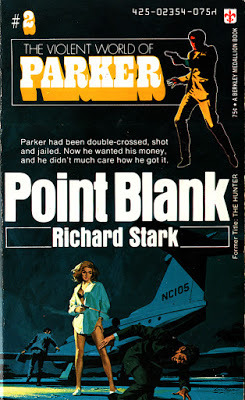
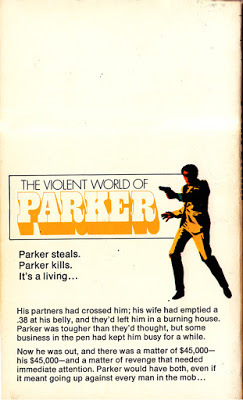
The opening paragraph of Point Blank:
“When a fresh-faced guy in a Chevy offered him a lift, Parker told him to go to hell. The guy said, ‘Screw you, buddy,’ yanked his Chevy back into the stream of traffic, and roared on down the tollbooths. Parker spat in the right-hand lane, lit hislast cigarette, and walked across the George Washington Bridge.”
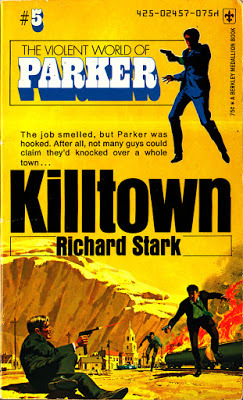
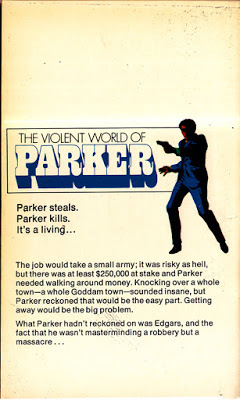
The opening paragraph of Killtown:
“When the bellboy left, Parker went over to the house phone and made his call. He gave the operator downstairs the number he wanted, and waited while the phone clicked and ticked and snicked in his ear. He was feeling impatient, and he was about to go downstairs and put in the call from a pay phone when all the clicking finally quit and a ringing sound started instead.”

You are subscribed to email updates from Gravetapping.
To stop receiving these emails, you may unsubscribe now.
Published on September 24, 2015 07:49
September 23, 2015
reviews THE MARILYN TAPES now on Kindle
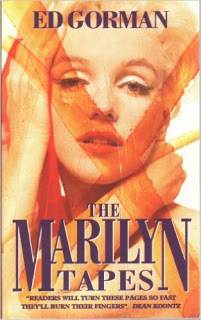 $2.99 on Kindle now
$2.99 on Kindle now"The flip side of James Elroy's justly acclaimed American Tabloid and equally as powerful."London's Sunday Time Out
"A fast paced tale of treachery and murder...the story ricochets off sociopathic gamesin high places."Publisher's Weekly
"A fascinating and suspenseful novel on a grand scale."The Drood Review
"A striking combination of Tom Clancy''s political thrillers and Elmore Leonard's hypnotically sassy novels of America's mean streets."Interzone (London)
"A powerful and indelible portrait of Marilyn Monroe even though Gorman never brings her on stage."Baker and Taylor
Published on September 23, 2015 14:18
September 22, 2015
The good ones: John McPartland by John Fraser
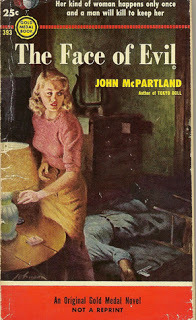
Ed here: I've reprinted my own piece on John McPartland two or three times in the past five years. Thought I'd let you see what a real critic has to say about him. This is John Fraser's take on McPartland, one of the Gold Medal boys who never got his due. What made him interesting to me was that he had a great Fitzgeraldian social eye for every strata of society, from blue collar all the way up to the gated communitiy folks.
McPartland was no genius but he came to writing with a voice and social take all his own and neither had anything to do with the hardboiled material then flooding the market. As John Fraser said to me in a recent letter, "McPartland deserves the attention. He seems rather to have slipped through the critical net, maybe because he didn't deal in the to my mind rather cliched noir depressiveness, with the inevitable failure of love."
John McPartland by John Fraser copyright 1998
The Face of Evil (1954)
She was the kind of woman a man noticed, mostly because of her eyes. Dark, almost black pools, they had a warmth that I felt could turn to fire. She had turned her head, looking over the shoulder of the man she was with, and we looked at each other. The third or fourth time it happened he noticed it and I paid some attention to what he was like.
He was a type. You find guys like him driving ten-wheeler transport trucks, or flying, or sometimes as chief petty officers in the Navy, on a sub or a destroyer. Square-built, tough tanned skin, big hands with knuckles that are chunks of stone.The type—what makes him recognizable as a wanderer, a fighter, sometimes a killer—shows in his face.
Big white teeth, yellow a little from cigarettes like his fingers, and he smiles with his teeth closed, talking through them when he’s angry. A thin line of short black hairs for a mustache, sideburns of curling hair, hair black and curly, a face that is rough and yet young, and it won’t change much if he lives to be fifty. The eyes are fierce, amused, hard.
It’s a special breed of man, and the breed are men. Maybe a mixture of German, Irish, French-Canadian, with a streak of Comanche, Ute, or Cheyenne in there about three generations back. You meet men like this one in the truck-stop cafés along U.S. 40, with the diesels drumming outside; or you meet them walking toward the plane on the airstrip; or in jail, still smiling, still ready for a fight.
This guy was laughing as he swung off the bar stool. He was still laughing as he walked over to me.
The Face of Evil (1954)
I
McPartland is that rarity, a writer of tough novels who feels tough himself. (Was Spillane a barroom brawler? If so, did he win?)
McPartland was one of the Gold Medal blue-collar writers; had served in Korea; obviously knew the black-market milieu of that war; came back and wrote raw, rugged, at times very powerful novels; obviously drank, lived with a mistress and illegitimate kids before it was OK to do so; and died young of a heart attack. He was the kind of person who knew what it meant to be in trouble with the law, doing dumb impetuous things, getting into fights.
What comes across again and again in his novels is his understanding of power, the hard masculine will to dominate others, break them, destroy them. His bad guys are some of the most frightening in thriller fiction: Southern rednecks, syndicate “troopers,” the Mob. His fights are fights in which the loser can get hurt very badly.
When a black-marketing non-com says he’s going to scramble someone’s eggs with his combat boots (crush his testicles), or the middle-echelon syndicate enforcer Whitey Darcy tells the fixer Bill Oxford, “We’re going to make you cry, feller,” or when Buddy Brown, the twenty-year-old petty crook in Big Red’s Daughter (1955) tells Jim Work that he’s going to make him crawl, we know that’s just what they intend to do.
They are hard men.
King McCarthy in The Face of Evil (1955) is a natural fighter. Buddy Brown wins his first two fights with the hero—knocks him down with a sucker punch; gets a painful lock on his knuckles and punches him in the throat while they’re sitting drinking beer in a barroom booth. And the Syndicate, the Mafia, punish offenders ruthlessly. Oxford knows what it will be like to go to prison and have your kidneys smashed by an inmate, crippled with pain for the rest of your life every time you pee. Johnny Cool’s end in The Kingdom of Johnny Cool is dreadful.
However, in most of the novels there isn’t just violence, there’s also love, and things work out all right in the end for the hero and heroine. They very easily couldn’t, though. A strong, focussed counter-energy on the part of the heroes is necessary.
II
McPartland’s best book is The Face of Evil, about the fixer Bill Oxford, who’s been on the long downward slide of compromise, complicity, corruption, and has been sent to Long Beach by the PR agency to which he’s attached to ruin a genuinely decent reform candidate, upon pain of being stripped of all his high-living perks and slammed into prison. It is tense and well-made throughout.
The Kingdom of Johnny Cool is his other best novel. When it appeared, I wrote to Ross Macdonald (a total stranger, but he’d done a Ph.D. in English himself) to ask him to review it for a student journal I was co-editing. He declined, saying that it seemed to be simply Spillane-type melodrama. He was wrong.
The novel is a powerful account of a Sicilian criminal’s rise and fall in America—a more interesting one than W.R. Burnett’s Little Caesar (1929)—and it takes us into dark cold waters full of predators. McPartland was on to the Mafia as a subject twelve years before The Godfather, and his attitude towards it is far healthier than Puzo’s sentimental power worship. There’s nothing cute or admirable about McPartland’s Italianos.
Published on September 22, 2015 13:46
September 21, 2015
Gravetapping OVERHEAD by Jack M. Bickham
Ben Boulden:Posted: 20 Sep 2015 05:31 PM PDT
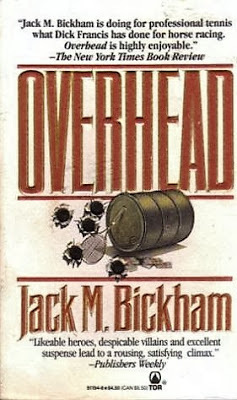 Overhead is the third novel featuring Brad Smith. It was published in 1991 by Tor, and it is something of a transitional novel in the series. It is longer than the first two—as are the three that follow—and it permanently moves Brad from Richardson, Texas to the fictional Elk City, Montana.
Overhead is the third novel featuring Brad Smith. It was published in 1991 by Tor, and it is something of a transitional novel in the series. It is longer than the first two—as are the three that follow—and it permanently moves Brad from Richardson, Texas to the fictional Elk City, Montana. Brad’s old tennis pal, Ted Treacher—who helped Danisa escape Yugoslavia in Tiebreaker —purchased a tennis and golf resort outside of Elk City. There is local opposition, and he is leveraged to the eyeballs. Ted wants Brad’s help to set up a small professional tournament. He has $60,000 purse money and the tournament would bring welcome publicity. Collie wants Brad to do some snooping while he is there. A civilian employee of a nearby Air Force research facility was caught removing classified data, but murdered before she could talk. The FBI thinks the Soviets are behind both spying and murder. It also thinks the killer is Brad’s old nemesis Sylvester. A little loyalty—to Ted, mostly—and a quarrel with the new head tennis pro at the resort Brad works, persuades him to load his Bronco and go to Montana.
Overhead is the weakest of the Brad Smith novels. It is longer than the first two, and several subplots run through its length; specifically, a corporate corruption scandal and an unexplained high rate of child death in Elk City. It is busy, and all of the intrigue distracts from the main focus of the novel—Brad’s and Sylvester’s ever growing annoyance with each other. It isn’t a bad novel at all, but it isn’t quite as good as the other novels in the series.
The good stuff is the setting, characters, and suspense. Mr. Bickham develops the cloying small town atmosphere of Elk City nicely, and does an even better job with the resort. The characters are never without believable motivation. There is the bully-psychopath Elk City cop, Ted who is falling apart under the financial pressure of the resort, Ardis Allen, a cutthroat businesswoman, Sylvester, and Brad. It is also structured to achieve a high level of suspense. It is written in first—Brad’s perspective—and third person, and the alternating perspective allows the author to prolong suspenseful scenes across more than one chapter (and it works very well).
There is also a nice touch of social commentary, and something about the human experience. My favorite—
“Hemingway liked to talk about how life sometimes bent people, sometimes in such a way that they healed and went on, stronger because of the hurt. He said life sometimes broke people, too. But he never really came to terms with that. Maybe he couldn’t. Maybe at the very end Hemingway understood being truly broken, beyond healing, and that was why he went down to the hallway that fine sunny morning outside of Ketchum and put both barrels of the shotgun to his forehead, just above the eyes, and pulled both triggers.”
Overhead may not be the best of Jack Bickham’s Brad Smith novels, but it is still an exciting, entertaining, and very worthwhile read.

Published on September 21, 2015 14:12
September 20, 2015
The new issue of Clues
THURSDAY, SEPTEMBER 17, 2015Clues 33.2: Patricia Highsmith, Per Wahlöö.
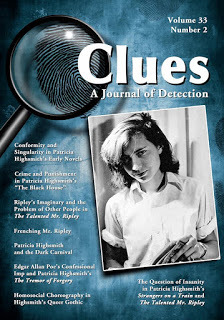 In honor of the 20th anniversary of Patricia Highsmith's death and the 40th anniversary of Per Wahlöö's
death, Clues 33.2 (2015) has been published. It is a theme issue on the work of Highsmith, plus reveals Wahlöö's plans for another Martin Beck novel near the end of his life. Abstracts follow below. Contact McFarland to order the issue or to subscribe to the journal.
In honor of the 20th anniversary of Patricia Highsmith's death and the 40th anniversary of Per Wahlöö's
death, Clues 33.2 (2015) has been published. It is a theme issue on the work of Highsmith, plus reveals Wahlöö's plans for another Martin Beck novel near the end of his life. Abstracts follow below. Contact McFarland to order the issue or to subscribe to the journal.
Introduction: Re-Evaluating Patricia Highsmith
FIONA PETERS (Bath Spa Univ, UK)
Conformity and Singularity in Patricia Highsmith’s Early Novels
FIONA PETERS
This essay explores Highsmith’s critique of the American suburbs in the novels of the 1950s and early 1960s. It focuses on This Sweet Sickness, highlighting not only Highsmith’s critique of conformity but also her recognition of the threat of psychic breakdown for those who resisted cultural norms.
“Sooner or later most of us get hooked”:
The Question of Insanity in Patricia Highsmith’s Strangers on a Train and The Talented Mr. Ripley
SAMANTHA WALTON (Bath Spa Univ, UK)
This article considers constructions of insanity in Strangers on a Trainand The Talented Mr. Ripley in the context of historical understandings of psychopathy and sociopathic personality disturbance. It examines Patricia Highsmith’s psychological influences and assesses how her novels have been read in relation to changing notions of criminal insanity in psychiatry, law, and culture.
Under an Atomic Sky: Patricia Highsmith, Fyodor Dostoevsky, and the Apocalyptic Imagination
ILSE SCHRYNEMAKERS (Queensboro Community College, NY)
This essay contextualizes Patricia Highsmith’s crime fiction within the ethos of a world with the atomic bomb, examining how her characters fit the prototype of Americans striving for and achieving a comfortable life. It also explores the significance of characters in such a world committing seemingly irrational actions.
Living “As If”: Ripley’s Imaginary and the Problem of Other People in The Talented Mr. Ripley
BRUCE WYSE (Wilfrid Laurier Univ, Canada)
In Patricia Highsmith’s The Talented Mr. Ripley, Tom Ripley finds reading people a challenge but copes through a form of everyday detection. The author argues that Ripley is an “as-if” character who passes for “normal” until his fantasized rapport with Dickie collapses. Through Dickie’s murder, he recaptures this imaginary bond.
JACQUI MILLER (Liverpool Hope Univ, UK)
Forgery is a recurrent theme in Patricia Highsmith’s work, both as a transgressive act and a metaphor for transformation. Positioning the films within their socio-historical context, the essay will examine the ways in which Tom Ripley is reconstructed or “forged” in the adaptations of Highsmith.
Frenching Mr. Ripley
K. A. LAITY (College of Saint Rose, NY)
The Criterion edition of René Clément’s Plein Soleil/Purple Noon (1960) gives vivid life to the French adaptation of Patricia Highsmith’s The Talented Mr. Ripley (1955). The script by Clément and Paul Gégauff retains the author’s moral ambiguity but eschews the character’s abjection and its related sexual ambiguity for a vigorous and untroubled heteronormativity.
Patricia Highsmith and the Dark Carnival
CRAIG A. WARREN (Penn State Behrend)
A study of the amusement-park sequence in Strangers on a Train(1950) reveals that Patricia Highsmith should be recognized as a founder of “dark carnival” writing, a subgenre of suspense and horror fiction that emerged during the second half of the twentieth century.
Strangers in Tunisia: Edgar Allan Poe’s Confessional Imp and Patricia Highsmith’s The Tremor of Forgery
A. B. EMRYS (emerita, Univ of Nebraska–Kearney)
This article discusses how Patricia Highsmith reworks dynamics from Strangers on a Train, including redirection of a scene from Edgar Allan Poe, to support Howard Ingham’s rejection of conventional judgment in The Tremor of Forgery. Ingham’s experiences, the author argues, anticipate Highsmith’s last novel, Small g.
Those Who Follow:
Homosocial Choreography in Highsmith’s Queer Gothic
BRAN NICOL (Univ of Surrey, UK)
Many of Patricia Highsmith’s plots are versions of what Eve Kosofsky Sedgwick calls the gothic “reversible male chase.” Focusing on The Two Faces of January and Those Who Walk Away, this essay explores how Highsmithian homosociality exposes the empty reflexivity of late–twentieth-century existence.
The Queer Death of Timothy Porter: Crime and Punishment in Patricia Highsmith’s “The Black House”
ALEXIS M. EGAN (Univ of New Orleans)
This essay examines Timothy Porter’s death in Patricia Highsmith’s “The Black House” as a symptom of violated gender norms in the public and private spheres. The article also examines Tom Ripley’s murder of Dickie Greenleaf in The Talented Mr. Ripley, considering whether it is space itself or a violation of gender that influences this act of violence.
RESEARCH NOTE
Last Words, 1975:
Per Wahlöö and the Book That Went Up in Smoke
PER HELLGREN (Strangnas, Sweden)
When Swedish crime writer Per Wahlöö died in 1975, he and his writing partner, Maj Sjöwall, had barely managed to finish their final novel, The Terrorists (1975). Following the recent discovery of Wahlöö’s last notes from his deathbed, previously unknown to the public, the author explores Wahlöö’s plans for an 11th Martin Beck novel.
REVIEWS
True Detection. Ed. Edia Connole, Paul J. Ennis, and Nicola Masciandaro JACK DUDLEY
Paul Elliott. Studying the British Crime Film
CHRISTOPHER K. COFFMAN
Peter Messent. The Crime Fiction Handbook JOHN SCAGGS
POSTED BY ELIZABETH FOXWELL AT 4:07 AMLABELS: EDGAR ALLAN POE, FYODOR DOSTOEVSKY, PATRICIA HIGHSMITH,PER WAHLOO
 In honor of the 20th anniversary of Patricia Highsmith's death and the 40th anniversary of Per Wahlöö's
death, Clues 33.2 (2015) has been published. It is a theme issue on the work of Highsmith, plus reveals Wahlöö's plans for another Martin Beck novel near the end of his life. Abstracts follow below. Contact McFarland to order the issue or to subscribe to the journal.
In honor of the 20th anniversary of Patricia Highsmith's death and the 40th anniversary of Per Wahlöö's
death, Clues 33.2 (2015) has been published. It is a theme issue on the work of Highsmith, plus reveals Wahlöö's plans for another Martin Beck novel near the end of his life. Abstracts follow below. Contact McFarland to order the issue or to subscribe to the journal.Introduction: Re-Evaluating Patricia Highsmith
FIONA PETERS (Bath Spa Univ, UK)
Conformity and Singularity in Patricia Highsmith’s Early Novels
FIONA PETERS
This essay explores Highsmith’s critique of the American suburbs in the novels of the 1950s and early 1960s. It focuses on This Sweet Sickness, highlighting not only Highsmith’s critique of conformity but also her recognition of the threat of psychic breakdown for those who resisted cultural norms.
“Sooner or later most of us get hooked”:
The Question of Insanity in Patricia Highsmith’s Strangers on a Train and The Talented Mr. Ripley
SAMANTHA WALTON (Bath Spa Univ, UK)
This article considers constructions of insanity in Strangers on a Trainand The Talented Mr. Ripley in the context of historical understandings of psychopathy and sociopathic personality disturbance. It examines Patricia Highsmith’s psychological influences and assesses how her novels have been read in relation to changing notions of criminal insanity in psychiatry, law, and culture.
Under an Atomic Sky: Patricia Highsmith, Fyodor Dostoevsky, and the Apocalyptic Imagination
ILSE SCHRYNEMAKERS (Queensboro Community College, NY)
This essay contextualizes Patricia Highsmith’s crime fiction within the ethos of a world with the atomic bomb, examining how her characters fit the prototype of Americans striving for and achieving a comfortable life. It also explores the significance of characters in such a world committing seemingly irrational actions.
Living “As If”: Ripley’s Imaginary and the Problem of Other People in The Talented Mr. Ripley
BRUCE WYSE (Wilfrid Laurier Univ, Canada)
In Patricia Highsmith’s The Talented Mr. Ripley, Tom Ripley finds reading people a challenge but copes through a form of everyday detection. The author argues that Ripley is an “as-if” character who passes for “normal” until his fantasized rapport with Dickie collapses. Through Dickie’s murder, he recaptures this imaginary bond.
JACQUI MILLER (Liverpool Hope Univ, UK)
Forgery is a recurrent theme in Patricia Highsmith’s work, both as a transgressive act and a metaphor for transformation. Positioning the films within their socio-historical context, the essay will examine the ways in which Tom Ripley is reconstructed or “forged” in the adaptations of Highsmith.
Frenching Mr. Ripley
K. A. LAITY (College of Saint Rose, NY)
The Criterion edition of René Clément’s Plein Soleil/Purple Noon (1960) gives vivid life to the French adaptation of Patricia Highsmith’s The Talented Mr. Ripley (1955). The script by Clément and Paul Gégauff retains the author’s moral ambiguity but eschews the character’s abjection and its related sexual ambiguity for a vigorous and untroubled heteronormativity.
Patricia Highsmith and the Dark Carnival
CRAIG A. WARREN (Penn State Behrend)
A study of the amusement-park sequence in Strangers on a Train(1950) reveals that Patricia Highsmith should be recognized as a founder of “dark carnival” writing, a subgenre of suspense and horror fiction that emerged during the second half of the twentieth century.
Strangers in Tunisia: Edgar Allan Poe’s Confessional Imp and Patricia Highsmith’s The Tremor of Forgery
A. B. EMRYS (emerita, Univ of Nebraska–Kearney)
This article discusses how Patricia Highsmith reworks dynamics from Strangers on a Train, including redirection of a scene from Edgar Allan Poe, to support Howard Ingham’s rejection of conventional judgment in The Tremor of Forgery. Ingham’s experiences, the author argues, anticipate Highsmith’s last novel, Small g.
Those Who Follow:
Homosocial Choreography in Highsmith’s Queer Gothic
BRAN NICOL (Univ of Surrey, UK)
Many of Patricia Highsmith’s plots are versions of what Eve Kosofsky Sedgwick calls the gothic “reversible male chase.” Focusing on The Two Faces of January and Those Who Walk Away, this essay explores how Highsmithian homosociality exposes the empty reflexivity of late–twentieth-century existence.
The Queer Death of Timothy Porter: Crime and Punishment in Patricia Highsmith’s “The Black House”
ALEXIS M. EGAN (Univ of New Orleans)
This essay examines Timothy Porter’s death in Patricia Highsmith’s “The Black House” as a symptom of violated gender norms in the public and private spheres. The article also examines Tom Ripley’s murder of Dickie Greenleaf in The Talented Mr. Ripley, considering whether it is space itself or a violation of gender that influences this act of violence.
RESEARCH NOTE
Last Words, 1975:
Per Wahlöö and the Book That Went Up in Smoke
PER HELLGREN (Strangnas, Sweden)
When Swedish crime writer Per Wahlöö died in 1975, he and his writing partner, Maj Sjöwall, had barely managed to finish their final novel, The Terrorists (1975). Following the recent discovery of Wahlöö’s last notes from his deathbed, previously unknown to the public, the author explores Wahlöö’s plans for an 11th Martin Beck novel.
REVIEWS
True Detection. Ed. Edia Connole, Paul J. Ennis, and Nicola Masciandaro JACK DUDLEY
Paul Elliott. Studying the British Crime Film
CHRISTOPHER K. COFFMAN
Peter Messent. The Crime Fiction Handbook JOHN SCAGGS
POSTED BY ELIZABETH FOXWELL AT 4:07 AMLABELS: EDGAR ALLAN POE, FYODOR DOSTOEVSKY, PATRICIA HIGHSMITH,PER WAHLOO
Published on September 20, 2015 14:38
The GREAT Ken Levine at his killer best my fave the heidi klum
Emmy flashbacks
 I’ll be reviewing tonight’s Emmy Awards. Check back tomorrow. But to get you in the mood, here are a few snarky inappropriate highlights from past Emmy reviews. Enjoy.
I’ll be reviewing tonight’s Emmy Awards. Check back tomorrow. But to get you in the mood, here are a few snarky inappropriate highlights from past Emmy reviews. Enjoy.Note to Jeff Daniels and a lot of actors last night: ease up on the spray tan. There’s something wrong when Jeff Daniels is darker than Mindy Kaling.
Elton John, who has nothing to do with television, did a tribute to Liberace. I forget the title. “Candelabra in the Wind” I think.
The WHITNEY Emmy screener makes a really nifty coaster.
The Academy sent out a pretty clear message. Louis C.K. – not yet. Lena Dunham – not happening. Chuck Lorre – never.
What does it say when Bill Maher is now 0-32 and most Emmy voters are Democrats?
If Zosia Mamet’s dress was the result of another Kickstarter campaign she must’ve only raised eleven dollars.
GAME CHANGE won so Hollywood finally voted for Sarah Palin.
Kevin Costner won for playing a cowboy, which is what he should be playing. His days of portraying a baseball player are over unless they do a screen version of CHEERS and hire him as the Coach.
Christine Baranski, in a gold plated gown, looked like C-3PO caught cross-dressing.
Producer Mark Burnett has said that the “In Memoriam” segment doesn’t have to be such a downer. Really??? To that end, the song under the clips was “Where Dem Girls At”.
Six winners told their kids to go to bed. Five thanked Jesus. One told Jesus to go to bed.
Gray ribbons this year as Hollywood rallies to provide relief to the hurricane victims in the Hamptons whose guest homes and tennis courts sustained water damage.
Kate Winslet and Martin Scorsese won Emmys for having already won Oscars. When you win an Academy Award they should just throw an Emmy in the swag bag.
At least one Red Carpet interviewer asked Margo Martindale if she was coming back next year on JUSTIFIED (note: her character was killed)and another said how much she loved Margo's dad, Wink. Still another was hoping the "real" Mildred Pierce would be there for the ceremony.
What was that hideous song Jewel sang? I hate to say it but it really brought down the “In Memoriam” section.
For the first time ever the Emmys were shown live in Los Angeles. NBC recognized they were up against very stiff competition this year -- the Chabad Telethon.
Al Pacino’s won a million awards and his speech was like your uncle Lou’s just before the paramedics came.
Did you notice that not one winner all night, any category, thanked a network or studio for notes?
When Jessica Lange was thanking everyone in the world I was hoping for a promo crawl underneath her to say, “Jessica Lange speech over in 8 minutes.”
Letting Heidi Klum do comedy is like giving a squirrel a grenade.
Anyone who says Jewish girls don’t know how to dress didn’t see Sarah Silverman tonight in her Catholic Girl’s uniform.
By Ken Levine at 6:00 AM

 0 comments
0 comments
Published on September 20, 2015 06:10
September 19, 2015
4 of the finest p.i. novels around--and inexpensive on kindle READ THEM NOW
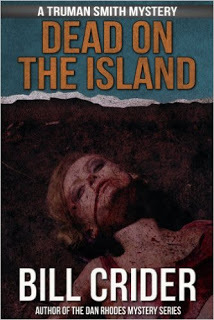 Nominated for the Shamus Award for Best First Private Eye Novel
Nominated for the Shamus Award for Best First Private Eye Novel One of Bill's finest books and an exemplary and very personal novel. The tenderness and melancholy
of a great "Rockford Files" script and proof positive that Bill has yet to get his due.
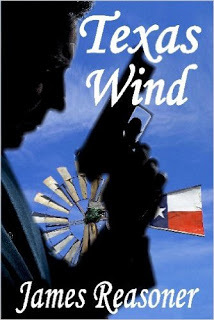
A masterpiece first published by a house so cheap and sleazy they may as well have printed it on a mimeograph. There is a great retro 70s fiction with a movie just waiting to be made of it.
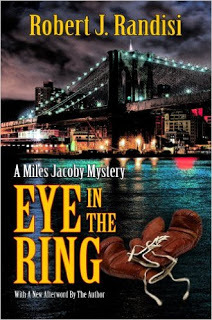 Elmore Leonard: "If Eye in the Ring moved any faster you'd have to nail it down to read it." Not only a classic p.i. novel but one of the finest novels about the business of boxing I've ever read. This is the way p.i. fiction should be done.
Elmore Leonard: "If Eye in the Ring moved any faster you'd have to nail it down to read it." Not only a classic p.i. novel but one of the finest novels about the business of boxing I've ever read. This is the way p.i. fiction should be done.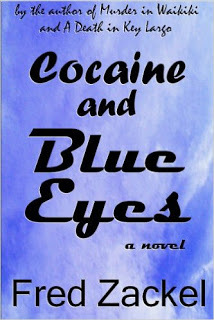
This novel broke the mold. An original compelling take on just about every p.i. trope you care to name. Every time I read it I want to find something wrong with it so I can call Fred and bray about it. But there's not one damned thing wrong with it anywhere.
Published on September 19, 2015 11:34
September 18, 2015
Opening Tonight-Gravetappinug's Facebook Page
Check it out!
 Ben BouldenSeptember 18 at 6:11pmThe first two novels of Ed Gorman's excellent crime-western Leo Guild
Ben BouldenSeptember 18 at 6:11pmThe first two novels of Ed Gorman's excellent crime-western Leo Guild
series are on sale for $1.99 on Kindle--GUILD, and DEATH GROUND.
Leo Guild is a half-broken former lawman turned bounty hunter.
He is always compassionate, and tough. There are four titles
in the series, and these two are a great place to start.
My favorite is DEATH GROUND, but not by much because
they are all awesome.You can now tag your friends in your status or post. Type @ and then t
ype the friend's name. For example: "Had lunch with @John Smith."Learn more about tagging on Facebook.
I was looking to see which Guild ebooks were on sale
and I foundDark Trail PB for $1.93. Smoking good deal.
Dark Trail (An Evans Novel of the West): Ed Gorman: 9781590772317: Amazon.com: Books Dark Trail (An Evans Novel of the West): Ed Gorman: 9781590772317: Amazon.com: BooksLeo Guild didn’t figure on running into his former wife Sarah again. Years earlier she’d left him for a gunfighter named Frank Evans. Guild is putting up in a river town, and hears Sarah is staying in a local hotel—she’s been looking for him. Leo’s heart soars, until...View on www.amazon.comPreview by Yahoo N
 Ben BouldenSeptember 18 at 6:11pmThe first two novels of Ed Gorman's excellent crime-western Leo Guild
Ben BouldenSeptember 18 at 6:11pmThe first two novels of Ed Gorman's excellent crime-western Leo Guild series are on sale for $1.99 on Kindle--GUILD, and DEATH GROUND.
Leo Guild is a half-broken former lawman turned bounty hunter.
He is always compassionate, and tough. There are four titles
in the series, and these two are a great place to start.
My favorite is DEATH GROUND, but not by much because
they are all awesome.You can now tag your friends in your status or post. Type @ and then t
ype the friend's name. For example: "Had lunch with @John Smith."Learn more about tagging on Facebook.
I was looking to see which Guild ebooks were on sale
and I foundDark Trail PB for $1.93. Smoking good deal.
Dark Trail (An Evans Novel of the West): Ed Gorman: 9781590772317: Amazon.com: Books Dark Trail (An Evans Novel of the West): Ed Gorman: 9781590772317: Amazon.com: BooksLeo Guild didn’t figure on running into his former wife Sarah again. Years earlier she’d left him for a gunfighter named Frank Evans. Guild is putting up in a river town, and hears Sarah is staying in a local hotel—she’s been looking for him. Leo’s heart soars, until...View on www.amazon.comPreview by Yahoo N
Published on September 18, 2015 17:59
Ed Gorman's Blog
- Ed Gorman's profile
- 118 followers
Ed Gorman isn't a Goodreads Author
(yet),
but they
do have a blog,
so here are some recent posts imported from
their feed.



